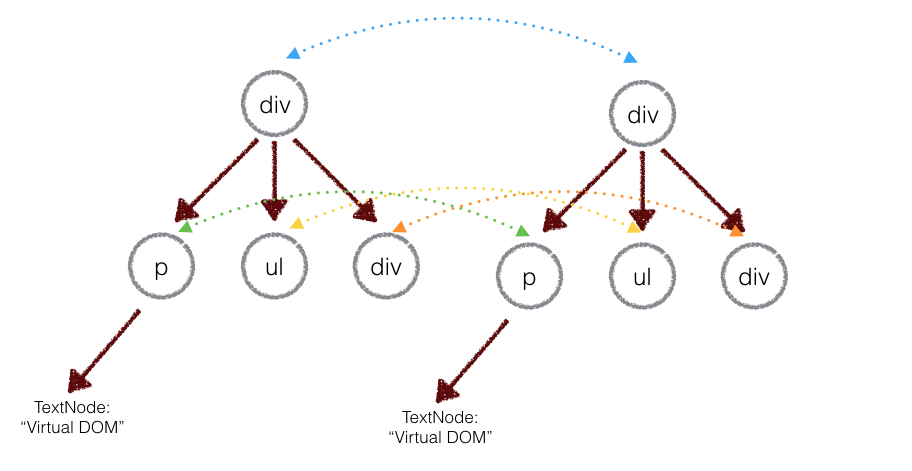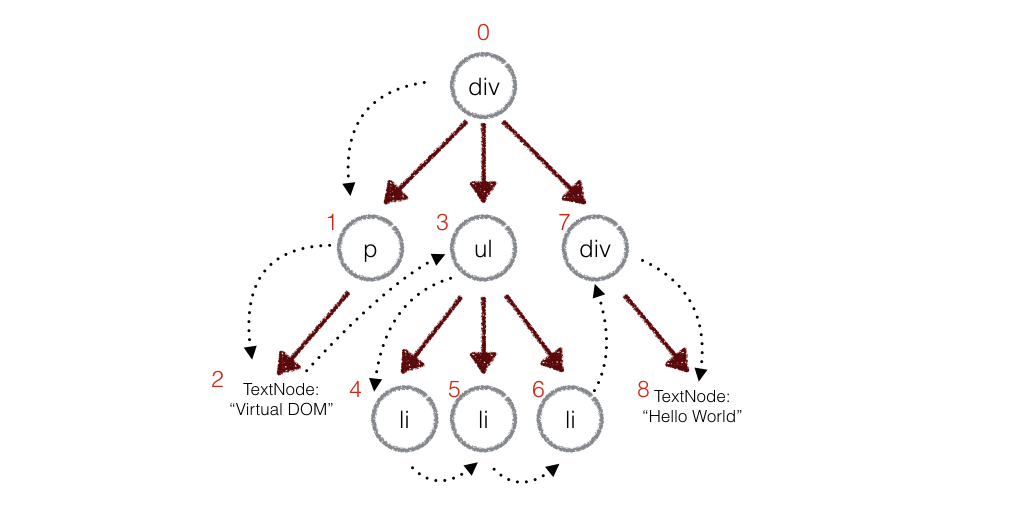虚拟DOM和diff算法
参考:
https://juejin.im/post/5a3200fe51882554bd5111a0
https://www.cnblogs.com/zhuzhenwei918/p/7271305.html
https://juejin.im/post/5ad6182df265da23906c8627
虚拟DOM
React将DOM抽象为虚拟DOM, 然后通过新旧虚拟DOM 这两个对象的差异(Diff算法),最终只把变化的部分重新渲染,提高渲染效率的过程; diff 是通过JS层面的计算,返回一个patch对象,即补丁对象,在通过特定的操作解析patch对象,完成页面的重新渲染


表示虚拟DOM的JS对象上面有如下三个属性:
- tagName: 用来表示这个元素的标签名。
- props: 用来表示这元素所包含的属性。
- children: 用来表示这元素的children(数组)。
虚拟DOM快取决于两个前提:1. JavaScript在浏览器上运行很快 2.DOM的渲染过程很慢,性能消耗高
用算法实现虚拟DOM:
function VDOM(tagName, props, children) {
this.tagName = tagName;
this.props = props;
this.children = children;
}
VDOM.prototype.render = function() {
// 建立一个真实元素
var el = document.createElement(this.tagName);
// 往该元素上添加属性
for (var name in this.props) {
el.setAttribute(name, this.props[name]);
}
// children是一个数组
var children = this.children || [];
for (var child of children) {
var childEl = (child instanceof VDOM) ? child.render() : document.createTextNode(child);
// 无论childEl是元素还是文字节点,都需要添加到这个元素中。
el.appendChild(childEl);
}
return el;
}
Diff算法
比较两颗DOM数的差异是Virtual DOM算法中最为核心的部分,这也就是所谓的Virtual DOM的diff算法。 两个树的完全的diff算法是一个时间复杂度为 O(n3) 的问题。 但是在前端中,你会很少跨层地移动DOM元素,所以真实的DOM算法会对同一个层级的元素进行对比。

上图中,div只会和同一层级的div对比,第二层级的只会和第二层级对比。 这样算法复杂度就可以达到O(n)。

上面的这个遍历过程就是深度优先,即深度完全完成之后,再转移位置。 在深度优先遍历的时候,每遍历到一个节点就把该节点和新的树进行对比,如果有差异的话就记录到一个对象里面。
diff.js 的简单代码实现:
在同层进行比较时候会出现四种情况:
1、此节点是否被移除 -> 添加新的节点
2、属性是否被改变 -> 旧属性改为新属性
3、文本内容被改变-> 旧内容改为新内容
4、节点要被整个替换 -> 结构完全不相同 移除整个替换
最后返回一个patch对象用来应用到实际的DOM tree更新,它的结构是这样的:
// index记录是哪一层的改变,type表示是哪种变化,第二个属性对应着变化存储相应的内容
patches = {index:[{type: utils.REMOVE/utils.TEXT/utils.ATTRS/utils.REPLACE, index/content/attrs/node: }, ...], ...}
let utils = require('./utils');
let keyIndex = 0;
function diff(oldTree, newTree) {
//记录差异的空对象。key就是老节点在原来虚拟DOM树中的序号,值就是一个差异对象数组
let patches = {};
keyIndex = 0; // 儿子要起另外一个标识
let index = 0; // 父亲的表示 1 儿子的标识就是1.1 1.2
walk(oldTree, newTree, index, patches);
return patches;
}
//遍历
function walk(oldNode, newNode, index, patches) {
let currentPatches = []; //这个数组里记录了所有的oldNode的变化
if (!newNode) { //如果新节点没有了,则认为此节点被删除了
currentPatches.push({type: utils.REMOVE, index});
//如果说老节点的新的节点都是文本节点的话
} else if (utils.isString(oldNode) && utils.isString(newNode)) {
//如果新的字符符值和旧的不一样
if (oldNode != newNode) {
///文本改变
currentPatches.push({type: utils.TEXT, content: newNode});
}
} else if (oldNode.tagName == newNode.tagName) {
//比较新旧元素的属性对象
let attrsPatch = diffAttr(oldNode.attrs, newNode.attrs);
//如果新旧元素有差异 的属性的话
if (Object.keys(attrsPatch).length > 0) {
//添加到差异数组中去
currentPatches.push({type: utils.ATTRS, attrs: attrsPatch});
}
//自己比完后再比自己的儿子们
diffChildren(oldNode.children, newNode.children, index, patches, currentPatches);
} else {
currentPatches.push({type: utils.REPLACE, node: newNode});
}
if (currentPatches.length > 0) {
patches[index] = currentPatches;
}
}
//老的节点的儿子们 新节点的儿子们 父节点的序号 完整补丁对象 当前旧节点的补丁对象
function diffChildren(oldChildren, newChildren, index, patches, currentPatches) {
oldChildren.forEach((child, idx) => {
walk(child, newChildren[idx], ++keyIndex, patches);
});
}
function diffAttr(oldAttrs, newAttrs) {
let attrsPatch = {};
for (let attr in oldAttrs) {
//如果说老的属性和新属性不一样。一种是值改变 ,一种是属性被删除 了
if (oldAttrs[attr] != newAttrs[attr]) {
attrsPatch[attr] = newAttrs[attr];
}
}
// 对比旧节点新增的属性
for (let attr in newAttrs) {
if (!oldAttrs.hasOwnProperty(attr)) {
attrsPatch[attr] = newAttrs[attr];
}
}
return attrsPatch;
}
module.exports = diff;
patch.js的简单实现
let keyIndex = 0;
let utils = require('./utils');
let allPatches;//这里就是完整的补丁包
function patch(root, patches) {
allPatches = patches;
walk(root);
}
function walk(node) {
let currentPatches = allPatches[keyIndex++];
(node.childNodes || []).forEach(child => walk(child));
if (currentPatches) {
doPatch(node, currentPatches);
}
}
function doPatch(node, currentPatches) {
currentPatches.forEach(patch => {
switch (patch.type) {
case utils.ATTRS:
for (let attr in patch.attrs) {
let value = patch.attrs[attr];
if (value) {
utils.setAttr(node, attr, value);
} else {
node.removeAttribute(attr);
}
}
break;
case utils.TEXT:
node.textContent = patch.content;
break;
case utils.REPLACE:
let newNode = (patch.node instanceof Element) ? path.node.render() : document.createTextNode(path.node);
node.parentNode.replaceChild(newNode, node);
break;
case utils.REMOVE:
node.parentNode.removeChild(node);
break;
}
});
}
module.exports = patch;



 浙公网安备 33010602011771号
浙公网安备 33010602011771号